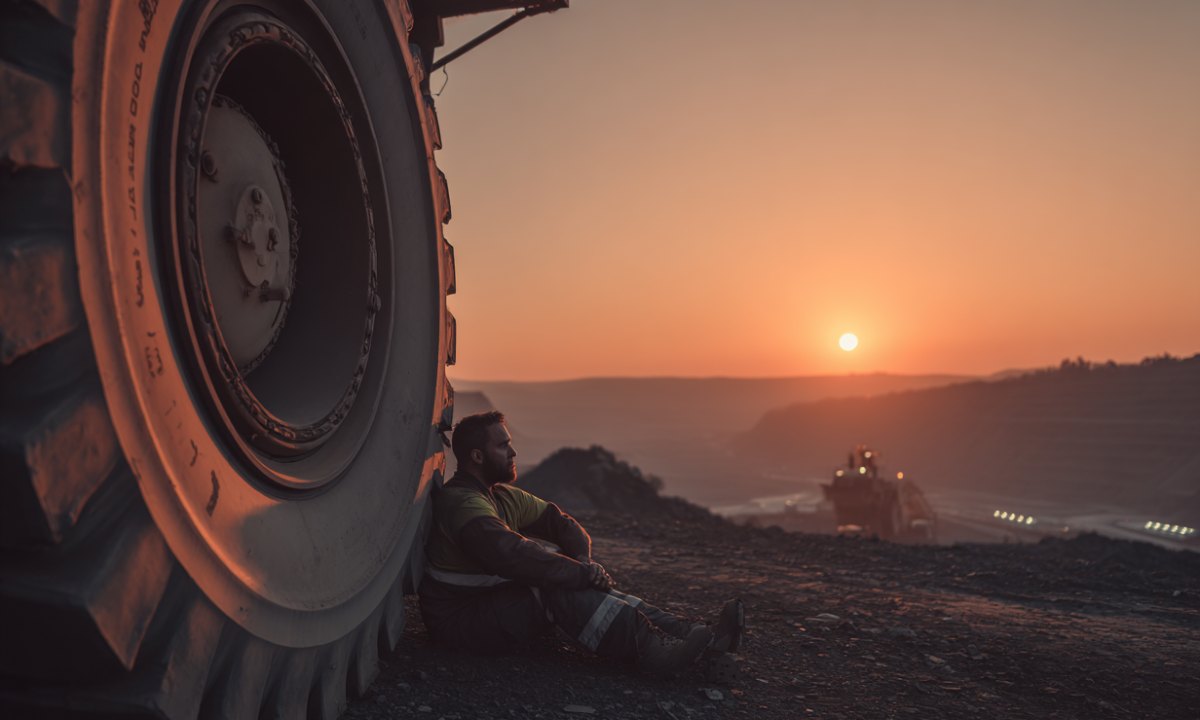Beyond the Roster: The Real Physical Cost of FIFO Life on Worker Health

Picture the scene: it’s early in the morning, you're at the midpoint of a 12-hour night shift, fuelled by coffee. You’re operating heavy machinery which requires constant attention, but your eyelids are drooping and your reaction times are slower than they should be.
That might sound familiar…
The mental health challenges associated with Fly-In, Fly-Out (FIFO) work (when an employer temporarily transports employees to a location or worksite and then transport them back for a period of rest) have rightfully gained attention in recent years, but it’s clear that the physical toll this demanding lifestyle takes is still not widely known.
For the thousands of Australians who work in the resource sector, long shifts, disrupted sleep patterns, and physically demanding conditions lead to an array of health risks that extend far beyond the roster.
This guide takes an in depth look at the unseen physical costs of FIFO life and some practical strategies to protect your health so you can maintain your livelihood.
The FIFO Landscape: Why Physical Health Gets Sidelined
FIFO work in Australia's mining and resources sector is usually conducted with what are known as compressed rosters: two weeks on-site followed by one week off, or "eight and six" patterns with 12+ hour shifts.
These schedules are very intense and create a range of unique challenges, with around two-thirds of FIFO workers reporting sleep disturbances, fatigue, and chronic health complaints. Studies have also shown increased rates of obesity among FIFO workers in comparison to the general population, which in turn increases the risk of conditions like heart disease and diabetes.
There are several factors that contribute to this:
- Remote locations with limited options for healthy and nutritious food
- Long hours leaving workers with little energy for exercise
- Disrupted sleep patterns caused by shift work
- Limited access to healthcare services
- The "push through and suck it up" culture that discourages reporting minor injuries
As one experienced FIFO worker put it: "Working in an environment with extreme heat, dust, and constant exposure to diesel fumes are all realities to consider and all conducive to speeding up aging."
Chronic Sleep Disruption: The Hidden Risk Factor
Chronic sleep disruption is perhaps the most pressing health threat for FIFO workers. Night shifts, rotating schedules, and unfamiliar sleeping environments all combine to disrupt the body's natural rhythms.

Research has shown that FIFO workers get significantly better sleep during off-shift days (7.5 hours vs. 6.3 hours) compared to days on-site. This leads to persistent sleep debt accumulating over time, with workers often describing jet lag-like symptoms.
This long term lack of sleep can have serious physical consequences:
- Studies found a 20% reduction in alertness among FIFO workers due to sleep loss
- Fatigue increases accident risk, with an estimated 10,000 serious workplace injuries in Australia linked to fatigue each year
- Long-term effects include heightened risk of cardiovascular disease, obesity, diabetes, and even early death
In cases where people are operating heavy machinery on just four hours of sleep, mistakes can be devastating, not just inconvenient.
Practical strategies:
- Using eye masks and earplugs to counter poor sleeping environments
- Establishing a wind-down routine before sleep and avoiding screens and caffeine for at least an hour before bed
- For night shifts, plan strategic short naps of less than half an hour during breaks
- Track your sleep patterns using a simple diary or app to help identify any problems
Musculoskeletal Injuries: The Wear and Tear of the Job
FIFO work can take a physical toll caused by repetitive lifting, awkward postures, extended periods of standing, and strong vibrations. These conditions are a perfect storm for musculoskeletal injuries to the back, shoulders, and knees.
These injuries are particularly problematic in FIFO settings because of the tendency of workers to simply "push through" minor strains. Limited time and access to appropriate places for proper warm-up, stretching, and/or early intervention means small issues often end up developing into chronic problems.
Protecting your body:
- Perform some basic stretches before every shift, with a particular focus on the back, shoulders, and legs
- Always follow proper lifting techniques and use any ergonomic aids available
- Never ignore minor aches, report them and seek attention as early as possible
- Buddy up with a co-worker to check on each other's physical condition
Fatigue, Heat Stress and Physical Safety
Fatigue and extreme working conditions combine to create a perilous mixture. Research has shown that fatigue impairs cognitive function and reaction time, increasing the risk of accidents occurring considerably, especially when heat stress comes into play.
Extreme temperatures in the workplace increase the risk of dehydration, heat exhaustion, and heatstroke. This is especially prevalent in remote parts of Australia. The majority of compensation claims for heat-related illnesses were related to sun exposure.
Managing these risks:
- Carry a water bottle and drink from it regularly, especially in hot conditions
- Learn to recognise the early signs of heat stress and fatigue
- Take scheduled breaks. Never skip them to "get ahead"
- Use the buddy system to watch out for symptoms in each other
- Report unsafe conditions immediately. Remember that employers have a legal duty to act
Access to Medical Care and Rehabilitation: The Remote Reality
One of the most significant challenges for FIFO workers is delayed and poor access to adequate healthcare when on site. This is because a lot of FIFO work takes place in remote locations with limited medical facilities which lack the resources for ongoing care or rehabilitation.
Many workers are reluctant to seek early treatment, which leads to minor injuries becoming major long-term health problems.
Overcoming healthcare barriers:
- Use telehealth services for non-emergency consultations
- Don't wait until you're back home to seek medical advice
- Learn your site's emergency medical protocols
- Keep detailed records of all symptoms and consultations
- Begin rehabilitation exercises as soon as they're recommended, even if they seem minor
Employer Liability: Who's Responsible When Things Go Wrong?
Under Australian Work Health and Safety laws, employers have a duty of care that extends beyond the immediate work environment into travel both to and from site and time spent in camp accommodation.
This means workers' compensation generally covers injuries that arise "out of or in the course of employment," including:
- Injuries during transit (bus, plane, or car accidents while traveling to site)
- Accidents in camp (slips in wet areas, falls in accommodation blocks, etc.)
- Onsite incidents linked to fatigue or roster-related factors
However, disputes can arise over what's considered "work-related," particularly in cases where reporting is delayed or documentation is incomplete.
Protecting your interests:
- Report all injuries and near misses immediately
- Document everything (dates, what happened, who was notified, etc.)
- Understand your employer's WHS and compensation policies
- For complex cases, seek union support or legal advice
Navigating the System: Practical Steps and Support
Staying on top of your physical health in a FIFO environment can be much easier by taking a proactive approach:
- Keep a health diary: track symptoms, injuries, and sleep patterns
- Seek early medical attention, even for minor issues
- Understand your rights under workers' compensation and employer policies
- Use available onsite health resources (gym facilities, nutrition advice, etc.)
- Stay connected with family/partners for support
For families and partners of FIFO workers, keeping an eye out for early signs of fatigue or injury and encouraging reporting and self-care can make a significant difference.
Resources: Where to Get Help
Keep these essential contacts handy, especially before starting a new roster:
Workers' Compensation and Safety:
- WorkCover QLD: 1300 362 128
- Safe Work Australia: www.safeworkaustralia.gov.au
Unions and Industry Bodies:
- Australian Workers' Union (AWU)
- Mining and Energy Union (MEU)
FIFO Support Organisations:
- FIFO Families (www.fifofamilies.com.au)
- Mates in Mining (www.matesinmining.org.au)
Health Services:
- Healthdirect: 1800 022 222
- Lifeline: 13 11 14
- Beyond Blue: 1300 224 636
Empowering Takeaways: Putting Your Health First
FIFO work is often lucrative, but it comes with real physical risks that require vigilance and proactive management.
To protect your health, it’s important to:
- Prioritise sleep hygiene: use blackout curtains, noise-cancelling headphones, and develop a consistent sleep routine
- Advocate for safer rosters: push for schedules that reduce fatigue and allow for proper recovery
- Report injuries early: if minor issues are left untreated they can easily escalate into chronic conditions
- Stay connected: keep up regular correspondence with family and support networks
- Use all available resources: from onsite health services to union support
You're not just a number on the roster. Your health is important and it matters. The Australian mining industry needs healthy, alert workers, and your family needs you to return home in good physical condition.
By understanding the physical risks of FIFO life and taking proactive steps to manage them, you can protect both your livelihood and your long-term well-being.
If it's time to talk, we're here to help. Get free advice direct from our solicitors today.





